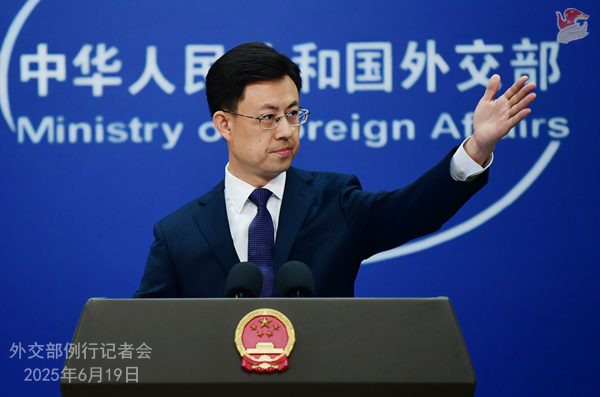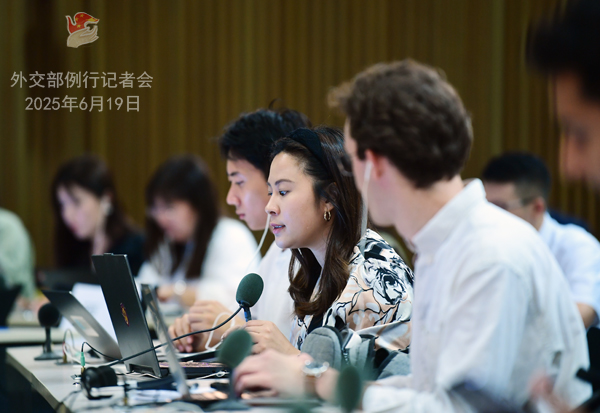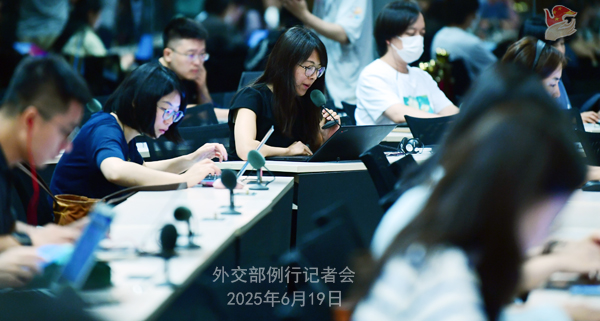
People’s Republic of China


Reuters: New Zealand has suspended budget funding to the Cook Islands. China and the Cook Islands signed a strategic partnership deal earlier this year. Would China be willing to step up financial support for the Cook Islands if the Cook Islands requests support?
Guo Jiakun: China and the Cook Islands are comprehensive strategic partners of mutual respect and common development. China is committed to building a community with a shared future for mankind. We have friendly cooperation with the Cook Islands in various areas based on equality and mutual benefit, and support the Cook Islands in growing its economy and improving people’s livelihood. Both New Zealand and the Cook Islands are China’s important cooperation partners. China’s cooperation with the Cook Islands does not target any third party and should not be disrupted or restrained by any third party.
China-Arab TV: On the early morning of June 19 Beijing time, Iran launched the 13th phase of Operation True Promise III on Israel, which lasted until 7 a.m. local time. It was the first time that Iran used the ultra-heavy, long-range Sejjil missile to strike targets in Israel. In the meantime, Israel is also increasing strikes on Tehran. Do you have any comment?
Guo Jiakun: It’s been a week since military conflict broke out between Israel and Iran. The conflict continues to escalate, not only wreaking havoc on the people in both countries, but also gravely hurting peace and stability in the region and beyond. China is deeply concerned. To escalate the conflict creates no winners, and will only cause even more damage and lead to larger turmoil. China strongly calls on the parties to the conflict, especially Israel, to act in the larger interest of the wellbeing of people of countries in the region, stop the conflict immediately, and deescalate the situation.
Bloomberg: U.S. officials are preparing for the possibility of a strike on Iran in the coming days, according to people familiar with the matter. The situation is still evolving. It could change. We’re wondering if the Foreign Ministry has any comment.
Guo Jiakun: The situation in the Middle East is tense and delicate and facing the risk of getting out of control. China opposes any move that violates the purposes and principles of the UN Charter and a country’s sovereignty, security and territorial integrity, and opposes using or threatening to use force in international relations. The international community, major country with influence in particular, needs to maintain a fair position and responsible attitude, create conditions for reaching a ceasefire and returning to dialogue and negotiation, and prevent the situation from sliding into abyss and triggering an even larger disaster.
TVB: Recently, the International Institute for Management Development (IMD) in Lausanne, Switzerland released its 2025 IMD World Competitiveness Yearbook, in which Hong Kong advances to the third position in the global competitiveness rankings. This is the first time Hong Kong has returned to top three in the rankings since 2019. The yearbook also puts Hong Kong at the first in the Tax Policy and Business Legislation rankings. Comments say that the rise in the rankings demonstrates that Hong Kong’s international position remains solid. What is your comment?
Guo Jiakun: I noticed the relevant yearbook. The yearbook is a recognition of Hong Kong’s unique position and strength, and the prospect of One Country, Two Systems. Hong Kong has entered a stage where it is set to thrive. It is becoming more attractive as an international financial center, and it is drawing more foreign companies and individuals to make investments and start new businesses. Hong Kong remains one of the world’s freest economies and most competitive regions. According to statistics, the Hong Kong Exchanges and Clearing Limited (HKEX) gained No.1 spot in global fundraising in the first half of this year, with a total amount of US$14 billion. The number of overseas visitors received by Hong Kong in the first five months of this year rose by 18 percent year on year, and a number of large international companies have redomiciled to Hong Kong. Those are votes of confidence for Hong Kong from the international community.
The Hong Kong National Security Law will soon enter its fifth year of implementation. We believe that with the institutional safeguards of One Country, Two Systems, and given Hong Kong’s unique advantage of having the backing of the motherland and being connected to the world as well as a secure environment for high-quality development, Hong Kong is headed to an even brighter future.

AFP: A follow-up on Israel-Iran. Can the Foreign Ministry share more details about its evacuation of Chinese citizens from the countries? How many citizens have been returned to China at this time?
Guo Jiakun: Up till now, our Ministry and the Chinese embassies and consulates in Iran, Israel and other neighboring countries have organized and coordinated the evacuation of over 1,600 Chinese nationals from Iran to safety, and several hundred Chinese nationals from Israel.
Our Ministry and diplomatic and consular missions will continue to do everything possible to help our fellow nationals move to safety and evacuate.
NHK: The U.S. State Department has announced it will resume student visa interview and require all applicants to make their social media accounts public for enhanced screening. How does the Chinese side view this policy and does the Chinese government view this move as a result or positive outcome of the recent telephone conversation between the presidents earlier this month?
Guo Jiakun: We are following the developments. China-U.S. education cooperation benefits both sides. China opposes politicizing education cooperation. We hope the U.S. will act on President Trump’s remarks about welcoming Chinese students to study in America and effectively protect the lawful and legitimate rights and interests of Chinese students and scholars in the U.S.
China-Arab TV: On June 18, the Foreign Minister of Oman said during a phone call with Foreign Minister Wang Yi that he expected China to exert greater influence in restoring peace and stability in the Middle East. Meanwhile, Foreign Minister Wang Yi also had a phone call with the Foreign Minister of Egypt yesterday. May I ask whether China has any plans or proposals?
Guo Jiakun: Following the outbreak of the conflict, President Xi Jinping has articulated China’s position. China has maintained communication with Iran, Israel, Egypt, Oman and other parties, calling for immediate measures to deescalate as soon as possible and prevent the region from being plunged into even greater turmoil. Military conflict is not a solution, and heating up of the region does not serve the common interests of the international community. China stands ready to continue to work with regional countries and the international community to play a constructive role in restoring peace and stability in the Middle East at an early date.
AFP: Malaysia’s government has said that it is verifying media reports that a Chinese company could be circumventing U.S. export curbs on AI chips. This would be by the firm using servers in Malaysia that use chips made by NVIDIA. Is the Foreign Ministry aware of this case? And does it have any comment?
Guo Jiakun: The Chinese government has all along asked Chinese enterprises to operate in accordance with laws and regulations. China is also against any action that coerces countries to limit their cooperation with China. China is willing to work with regional countries including Malaysia to jointly defend the free and open international trade order.




